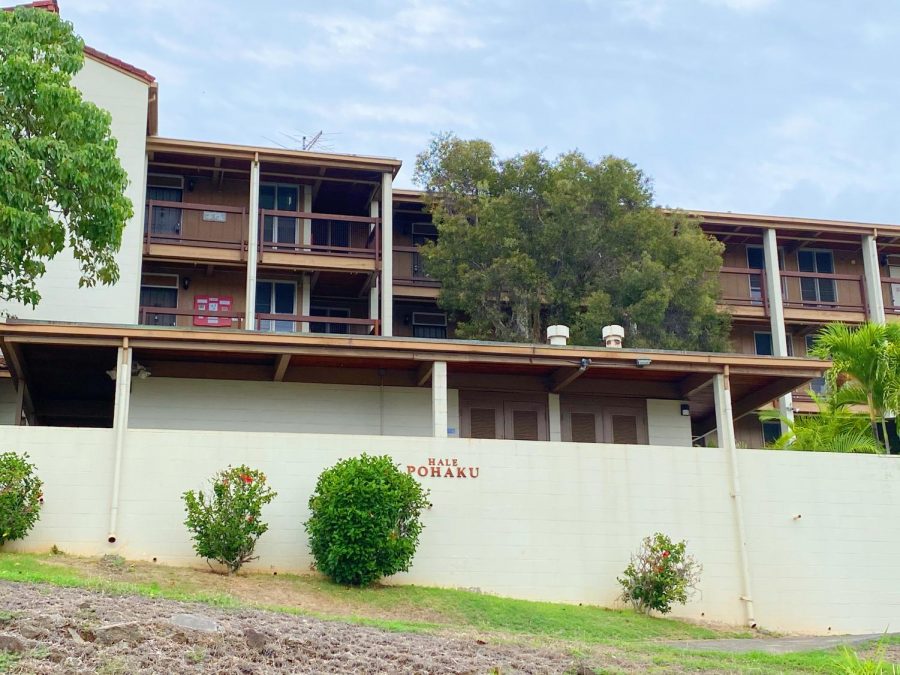Out of State Freshmen Frustrated with CUH Covid Response
Picture of Hale Pohaku, one of the dorms on CUH campus
Several CUH freshmen in the dorms — all of whom asked to remain anonymous — from out of state had to quarantine for two weeks. After they developed Covid-like symptoms and were unable to get a test, these freshmen were frustrated with the university’s response.
“I don’t want to say misinformation, but just like they don’t know what to tell us,” one freshman said. “We’ve made so many phone calls and just like ‘Who said this?’, ‘Who said that?’, ‘Who are you talking to?’ Like there wasn’t really a plan. It’s crazy trying to figure all of this out on our own. It’s insane.”
One of the freshmen had a low-grade fever and decided to contact someone at CUH to see what to do. The freshmen who were exposed to the student took their temperatures, and they all had a low-grade fever. CUH contact tracers told the freshmen to quarantine themselves in their rooms and that the RAs would bring them food and supplies like toilet paper.
“We all quickly realized that we had two options to return to normal life,” said one of the quarantining freshmen. “It was either we go and get a test and show that it’s negative, or we TeleHealth [remote healthcare] with a doctor here, and if they say that we don’t need a test then we just sign a waiver.”
Chaminade provides a taxi service for medical transportation free of charge for students living in the university residence halls, including the university’s off-campus apartments. One of the freshmen stated that they tried to get tested for Covid but ran into many problems. They ordered the cab service through CUH but found out the cab service will only take them to a walk-in testing center, not a drive-thru testing center.
The freshman shared their frustration that the university seemed to have demonstrated poor preparation for a situation like this. They stated that getting answers from the school’s adminstration about what to do was a long and stressful process.
When asked about the students’ frustrations, the Dean of Students, Allison Jerome, was understanding but defended CUH’s response.
“As with everything with Covid, we have had plans in place and when we put the plans into action, we’ve constantly had to [say], ‘Okay, try this, this doesn’t work, change it a little bit’ … and we continue to do that with all of this,” Jerome said. “I hate to use the word pivot, but that’s what it is basically. This has been [happening] since March with everything that we’ve done.”
Jerome stated that Chaminade is trying its best and moving as quickly as it can to help students who have to quarantine. The university is following the recommendations and guidelines it gets from medical professionals, the CDC, and the Hawaii Department of Health to keep the community on campus safe. She also pointed out that Chaminade has about six or seven people on campus trained as contact tracers. They work with students who have Covid-like symptoms to figure out who or what they may have been in contact with.
“I think sometimes students maybe don’t realize were not doing this to make it hard on you, were doing it to keep everybody safe,” said Jerome, who also emphasized that she understood how stressful a quarantine situation could be for a student in the dorms.
But those good intentions failed to make the situation any easier for the students, who were stuck in quarantine while being away from their loved ones. One of the students quarantined for eight days before testing negative at a walk-in testing center. Students were then required to turn their test results in to CUH to prove they came back negative.
“I’m 5,000 miles away from my family,” one freshman said. “I’m away from everything that I know. I don’t know anyone out here besides my roommates and a handful of friends, so the Covid situation of being so secluded definitely didn’t help the homesickness, you know, missing my friends, missing my family.”
